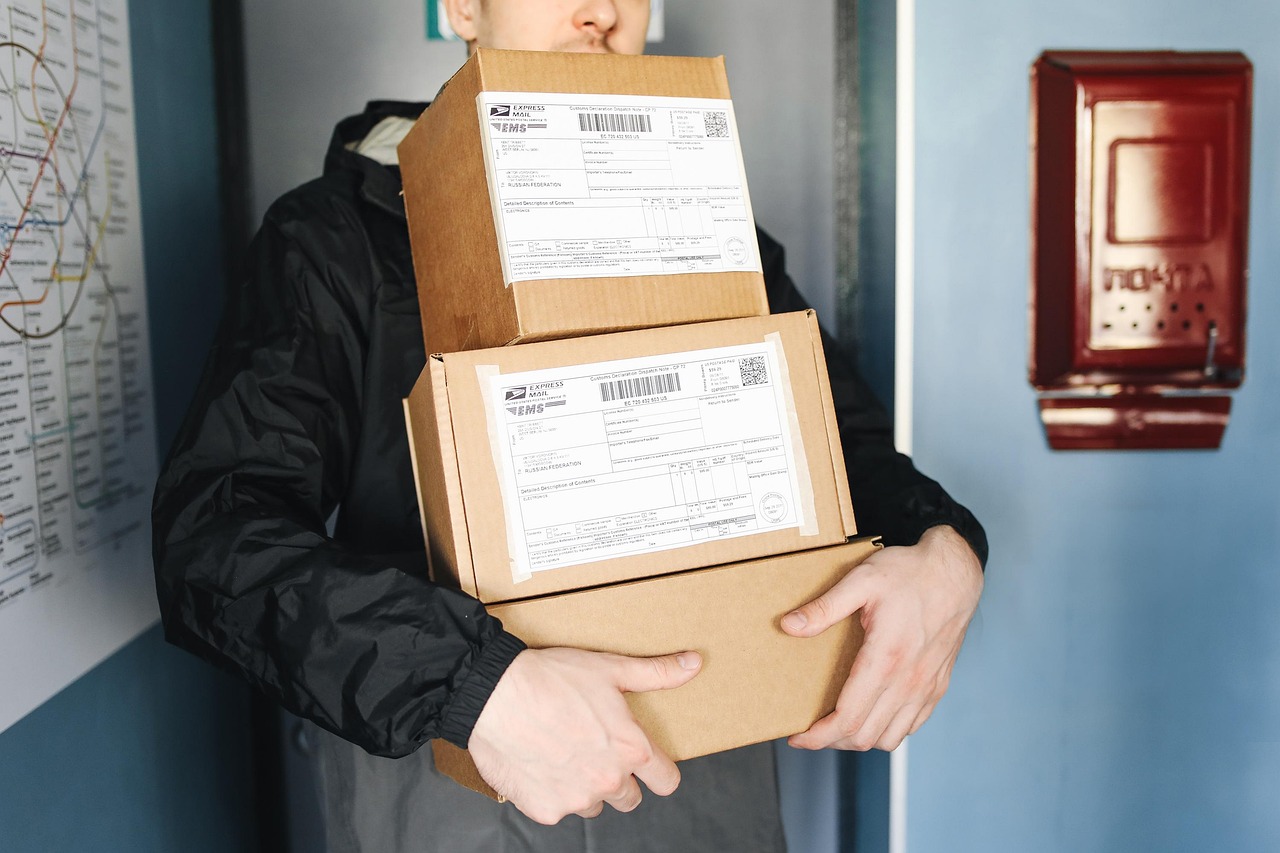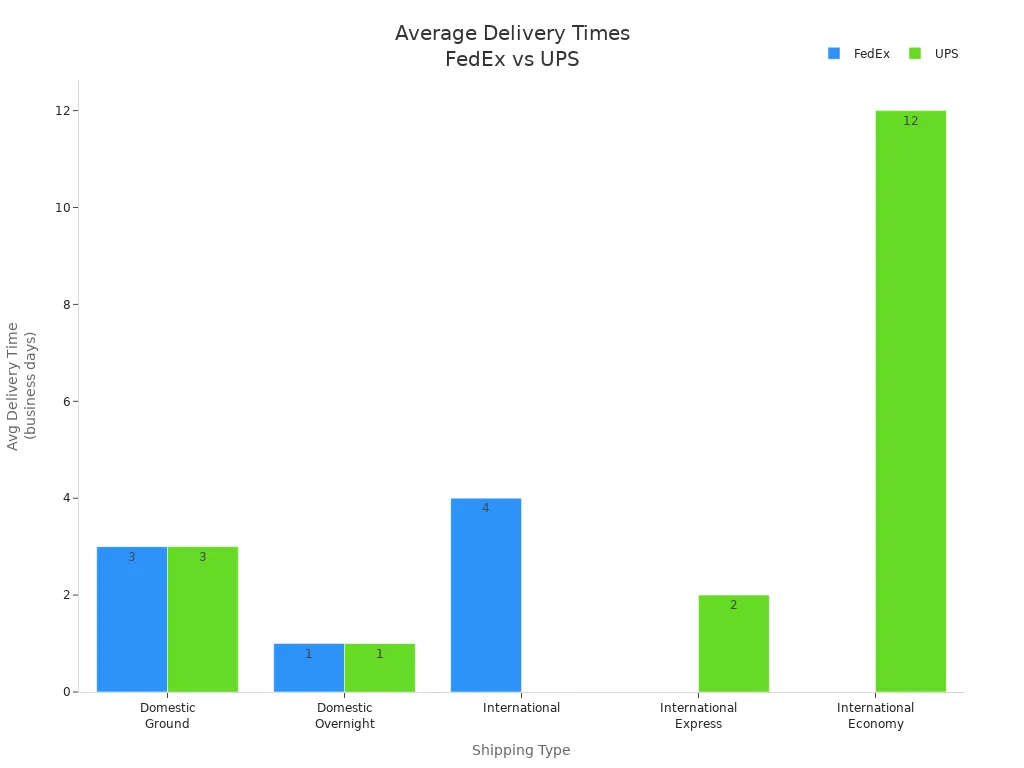DHL FedEx UPS Express Delivery Solutions and performance

Selecting the right express delivery provider shapes business success. Companies like DHL FedEx UPS influence efficiency, cost, and customer loyalty. Recent studies show that:
Fast, reliable services reduce storage costs and speed up product movement.
Over 60% of online shoppers abandon carts if delivery is slow.
Businesses see a 25% increase in repeat purchases with consistent express delivery.
Same-day and nationwide delivery build trust and foster growth.
A strategic logistics partner supports strong customer satisfaction and operational excellence.
Key Takeaways
Choosing the right express delivery provider like DHL, FedEx, or UPS improves speed, reliability, and customer satisfaction.
Each carrier has unique strengths: DHL excels in international shipping, FedEx leads in fast global delivery, and UPS offers strong domestic and specialized services.
Technology and real-time tracking from these providers help businesses deliver packages faster and keep customers informed.
JUSDA offers integrated supply chain solutions with tailored services for industries and cost-saving logistics beyond express delivery.
Businesses should match shipment type, destination, urgency, and budget with the provider’s strengths to optimize delivery and reduce costs.
Which Is Best?
Key Factors
Businesses face many choices when selecting an express delivery provider. The most important criteria include delivery speed, reliability, cost, tracking, and customer service. Companies also look for strong eCommerce integration and the ability to handle specialized shipments, such as fragile or regulated goods.
Shipping speed and coverage help ensure products reach customers on time, no matter the destination.
Cost versus value matters for companies balancing budgets with service quality.
Tracking and customer experience play a big role in building trust. Real-time updates and smooth delivery processes keep customers informed.
eCommerce integration allows businesses to connect their online stores with shipping systems for seamless order fulfillment.
Specialized shipping needs require carriers to handle items like perishables, hazardous materials, or temperature-sensitive goods safely.
Note: Delivery speed and reliability often tip the scales. FedEx stands out for fast international shipments, while UPS offers robust tracking and transparency. Dedicated support teams and personal account representatives help tailor solutions for each business.
The right choice depends on optimizing shipping strategy for efficiency, reliability, and long-term success.
DHL FedEx UPS Overview
DHL FedEx UPS lead the global express delivery market. Each company brings unique strengths and focuses to the table. The following table highlights key criteria and how each provider performs:
Criteria | UPS Strengths | FedEx Strengths | DHL Strengths |
|---|---|---|---|
Shipping Speed & Coverage | Reliable domestic shipping | Fast domestic & international delivery | Strong international shipping |
Pricing & Affordability | Flat rate, bulk pricing, discounts | Flat rate, bulk pricing, discounts | Bulk pricing, rewards program |
Technological Innovations | UPS My Choice®, Quantum View® | FedEx Delivery Manager®, SenseAware® | MyDHL+, DHL eTrack |
Insurance Options | UPS Capital® flexible insurance | Declared Value Advantage | DHL Cargo Insurance |
Customer Service | 24/7 support, live chat, email | 24/7 support, live chat, email | 24/7 support, live chat, email |
Ideal Use Case | Large volume, domestic shipments | Fast express, international shipments | International & e-commerce solutions |
Fleet & Capacity | Strong ground shipping & freight | Largest fleet & facilities worldwide | Strong European & global presence |
Specialized Solutions | Ground shipping, freight services | Overnight & express shipping | Temperature control, healthcare logistics |
DHL excels in cross-border shipping and customs clearance, especially in Europe and Asia. The company invests heavily in automation, AI, and innovative logistics solutions. DHL also leads in low-carbon logistics and sustainability efforts.
FedEx focuses on speed and reliability, with a hub-and-spoke model that supports overnight and two-day international delivery. The company handles delicate and temperature-sensitive shipments well. FedEx holds a strong position in North America and serves high-trust enterprise markets.
UPS stands out for its integrated single-network approach and operational efficiency. The company offers excellent timeliness and reliability, especially in North America and Europe. UPS specializes in hazardous goods and live animal transport, making it a top choice for complex logistics needs.
Tip: Companies should match their shipping needs with each provider’s strengths. For example, DHL offers the best solutions for international e-commerce, FedEx is ideal for urgent global shipments, and UPS provides reliable domestic and specialized services.
DHL FedEx UPS maintain leadership by investing in technology, expanding networks, and offering tailored solutions for different industries. Their strategies help businesses achieve reliable, efficient, and scalable shipping worldwide.
Service Comparison

Express Delivery Options
Businesses rely on express delivery options to meet customer expectations. DHL FedEx UPS each offer unique services that cater to different shipping needs.
DHL specializes in international shipping, providing a vast global network and tailored solutions for sensitive goods.
FedEx operates the largest air fleet, excelling in overnight and express deliveries for time-sensitive shipments.
UPS, the oldest provider, focuses on reliable domestic ground shipping and freight services.
All three companies offer advanced tracking, insurance, and 24/7 customer support. DHL stands out for international ecommerce and customs handling. FedEx leads in guaranteed delivery times for domestic shipments. UPS provides cost-effective ground shipping and strong customer service.
Delivery Speed
Delivery speed remains a critical factor for businesses. The following table compares the average delivery times for domestic and international shipments:
Carrier | Shipping Type | Delivery Speed Range | Average or Typical Delivery Time |
|---|---|---|---|
FedEx | Domestic Ground | 1-5 business days | ~3 business days |
FedEx | Domestic Overnight | Next business day | Next business day delivery |
FedEx | International | Next flight out to 2-7 business days | 1-7 days |
UPS | Domestic Ground | 1-5 business days | 1, 2-3, or up to 5 business days |
UPS | Domestic Overnight | Next business day morning delivery | Next business day delivery |
UPS | International | Express: 1-3 days; Economy: up to 12 days | |
DHL | Domestic & International | N/A | No published delivery speeds available |

FedEx and UPS publish clear delivery speed ranges. DHL focuses on international shipments, often delivering within 1-5 business days, but does not publish specific speed data.
Global Reach
DHL FedEx UPS maintain extensive global networks, serving over 220 countries and territories. The table below highlights their reach and regional strengths:
Company | Countries and Territories Served | Regional Strengths and Notes |
|---|---|---|
DHL | Over 220 | Strong in Europe and Asia |
UPS | Over 220 | Robust in North America |
FedEx | Over 220 | Rapid global express service |
DHL leads in Europe and Asia, supporting international ecommerce. UPS holds a strong position in North America, while FedEx emphasizes rapid global express delivery. Each company processes millions of shipments daily, ensuring reliable coverage for businesses worldwide.
Performance Metrics

On-Time Rates
On-time delivery rates show how well a carrier meets promised schedules. FedEx often achieves over 95% on-time performance for express shipments. UPS maintains similar rates, especially for domestic ground and overnight services. DHL focuses on international shipments and delivers most packages within the expected window. Reliable on-time rates help businesses keep customers happy and reduce complaints. Companies use these metrics to choose the best provider for urgent or time-sensitive deliveries.
Technology
Technology drives improvements in express delivery. Each company invests in new tools and systems to boost efficiency and security.
Company | |
|---|---|
DHL | AI, IoT, autonomous delivery robots, electric vehicles, advanced tracking apps |
FedEx | Automation, self-driving vehicles, robotics, ground network optimization, enhanced e-commerce fulfillment, advanced tracking apps |
UPS | Automation, machine learning (Deliverdefense), advanced tracking and management systems, sustainability initiatives |
DHL uses AI and IoT to track packages and deploys robots for last-mile delivery. Electric vehicles support sustainability goals.
FedEx relies on automation, robotics, and self-driving vehicles to speed up sorting and delivery. Their apps allow customers to reroute or reschedule shipments.
UPS applies machine learning to prevent package theft and uses advanced tracking systems for better visibility. Energy-efficient vehicles help reduce emissions.
Technology helps these carriers deliver faster, safer, and more reliable service. Businesses benefit from real-time tracking, flexible delivery options, and improved security.
Recommendations
International Shipping
Selecting the right provider for international shipping depends on network reach, speed, and reliability. Industry analysts often recommend these carriers for global shipments:
DHL offers an extensive global network, enabling overnight shipments to hundreds of countries. Many businesses choose DHL for its balance between speed and cost.
FedEx stands out for competitive international services, especially for fragile or temperature-sensitive shipments. Faster shipping times make FedEx a strong choice for urgent deliveries.
UPS provides a vast logistics network, covering over 220 countries and territories. UPS handles a wide range of shipments, including live animals and hazardous goods.
Industry analysis shows that these companies dominate the international express delivery market. Their door-to-door service and customs expertise help businesses reach customers worldwide.
Tip: For businesses shipping internationally, choosing a provider with customs support and a strong global network ensures smooth delivery and fewer delays.
Overnight Delivery
Overnight delivery requires speed, reliability, and responsive customer support. The following table compares the main strengths of each carrier for overnight and express services:
Carrier | Market Focus | Transit Times (Overnight/Express) | Pickup Fees | Live Customer Service | International Expertise | Pricing Advantage |
|---|---|---|---|---|---|---|
DHL | International | 1-3 days internationally, fast transit | Yes, live support | Yes, customs experts | Competitive for international | |
FedEx | Domestic & International | 1-5 days domestically, reliable overnight | Charges pickup fees | No live support without waiting | No | Strong tracking and insurance |
UPS | Domestic | 1-5 days domestically, next-day air options | Charges pickup fees | No live support without waiting | No | Reliable for ground and freight |
DHL leads in international overnight delivery, offering live customer support and no pickup fees. FedEx provides reliable overnight and express shipping, supported by a large air fleet. UPS excels in domestic ground and air shipments, with flat-rate pricing and strong North American coverage.
Note: Businesses with urgent international shipments often select DHL for speed and customs expertise. For domestic overnight needs, FedEx and UPS provide dependable options.
Cost Savings
Cost-saving strategies help businesses manage shipping expenses. Many organizations secure discounts and use technology to optimize logistics:
FedEx offers significant discounts for contracted clients, such as university departments, and provides corporate customer assistance.
UPS gives users access to web-based shipping tools and offers discounts for regular shippers.
DHL supports research and international document shipments, with coordinated pickups to streamline processes.
Logistics teams often help departments select the most cost-effective carrier and arrange pickups, especially when direct service is unavailable.
Specialized Needs
Specialized shipments require carriers with the right expertise and compliance standards. Leading providers address these needs in several ways:
DHL, FedEx, and UPS handle temperature-sensitive shipments and hazardous materials. DHL Express is especially noted for managing temperature-controlled deliveries.
Carriers must meet regulatory standards and maintain temperature control, such as replenishing ice during transit.
Strict scheduling for pickups and deliveries ensures shipment integrity.
Platforms like eShipGlobal integrate with these carriers to manage hazardous, export-controlled, and international shipments, ensuring compliance with federal regulations.
Proper packaging, tracking, and documentation remain critical for specialized shipping.
Choosing the right express delivery provider shapes business success. Each company offers unique strengths, from reliability and real-time tracking to tailored industry solutions. Businesses should:
Assess shipment urgency, destination, and special requirements.
Segment customers and define delivery tiers for better service.
Collect feedback and use data analytics to improve logistics.
Collaborate with partners and monitor performance closely.
FAQ
What makes JUSDA different from DHL, FedEx, and UPS?
JUSDA offers integrated supply chain solutions. The company manages every step, from raw materials to final delivery. DHL, FedEx, and UPS focus on express shipping. JUSDA uses advanced technology for real-time tracking and resource optimization.
Can JUSDA handle international shipments?
Yes, JUSDA supports global logistics. The company operates in over 155 locations worldwide. JUSDA manages customs clearance and provides bonded storage. Businesses can ship to many countries with reliable tracking and compliance.
Which provider is best for urgent overnight delivery?
FedEx and UPS lead in domestic overnight shipping. DHL excels in international express delivery. JUSDA uses AI-driven planning for timely shipments, especially for complex or cross-border orders.
Does JUSDA offer industry-specific logistics solutions?
JUSDA tailors services for industries like electronics, automotive, healthcare, and FMCG. The company uses specialized vehicles and packaging. Clients receive solutions that fit their unique needs.
How can businesses save on shipping costs with JUSDA?
JUSDA reduces costs through resource optimization and consolidation. The company matches shipments with the best routes and vehicles. Predictive analytics help businesses avoid empty miles and lower expenses.
See Also
How Artificial Intelligence Is Transforming Future Supply Chains
Discover Five Cutting-Edge Methods To Improve Supply Chains
Uncovering JUSDA’s Advanced Logistics For High-Tech Manufacturing
Effective Strategies To Solve Supply Chain Challenges In Manufacturing
Boosting Supply Chain Efficiency Through Cloud-Based Technologies
